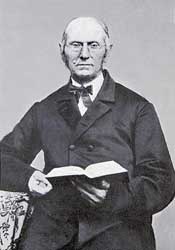- Joseph Bates (Adventist)
Infobox Person
name = Joseph Bates

image_size =
caption = Joseph Bates
birth_date = birth date|1792|7|8|mf=y
birth_place =Rochester, Massachusetts
death_date = death date and age|1872|3|19|1792|7|8|mf=y (age Age|1792|07|08|1872|03|19)
death_place =Battle Creek, Michigan
occupation = Sailor,
Author,
Teacher,
Entrepreneur,
Minister/Preacher,
Statesman
spouse =Joseph Bates (July 8, 1792 - March 19, 1872) was an American seaman and revivalist minister. He was the founder and developer of Sabbatarian Adventism that developed into the
Seventh-day Adventist Church . Bates is also credited with convincing James White andEllen G. White of the validity of the seventh-day Sabbath.Joseph Bates was born in
Rochester, Massachusetts onJuly 8 ,1792 . (He did not have a middle name.) His father, also named Joseph,cite web | year = 2002-2006 | url = http://www.adventistheritage.org/article.php?id=101 | title = Adventist Heritage : Footsteps of the Pioneers- Joseph Bates | accessdate = 2006-03-07] was a volunteer in theRevolutionary War and his mother was the daughter of Barnabas Rye ofSandwich, MA . In 1793, Bates' family moved to the part ofNew Bedford, Massachusetts that would become Fairhaven in 1812. In June 1807, Bates sailed as cabin boy on the new ship commanded byElias Terry , called the Fanny toLondon viaNew York City . This was the commencement of Bates sailing career.cite book | last = Bates | first = Elder Joseph | editor = Elder James White | title = The Early and Experience And Labors of Elder Joseph Bates | url = http://www.earlysda.com/bates/joseph-bates1.html | accessdate = 2006-03-07 | date = 1868-05-01 | chapter = Chapter 1 | chapterurl = http://www.earlysda.com/bates/joseph-bates1.html#CHAPTER%20I.]In 1810 Bates was forced into servitude for the British navy and spent time as a prisoner during the
War of 1812 . After his release he continued his career eventually becoming captain of a ship. During one of his voyages he read a copy of theBible that his wife packed for him. He experienced conversion and became involved in a variety of reforms including helping to found an early temperance society. Bates became disturbed by the way the sailors (regardless of their religion) were forced to go toAnglican services; later in life he became adamant that theseparation of church and state should be upheld. He also was a strong supporter ofabolition . In his everyday life as a sailor he noticed the intemperance of the sailors and the resulting side effects. Many of these problems came from poorration s but many more were the result of overindulgence by the men. He became one of the champions of health reform; abstaining from allalcohol ,tobacco , andcaffeine , even becoming avegetarian . In 1839 he accepted the teachings ofWilliam Miller that Jesus was coming soon.After
October 22, 1844 , like many other Millerites, Bates sought meaning out of theGreat Disappointment . During the spring of 1845 Bates accepted the seventh-day Sabbath after reading a pamphlet byT. M. Preble . Bates soon became known as the "apostle of the Sabbath" and wrote several booklets on the topic. One of the first, published in 1846, was entitled "The Seventh Day Sabbath, a Perpetual Sign". [ [http://www.gutenberg.org:80/dirs/2/2/0/9/22098/22098-h/22098-h.htm Joseph Bates: "The Seventh Day Sabbath, a Perpetual Sign, from the Beginning to the Entering into the Gates of the Holy City, According to the Commandment", 1846 (www.gutenberg.org)] ] One of Bates' most significant contribution was his ability to connect theologically the Sabbath with a unique understanding of the heavenly sanctuary. This apocalyptic understanding of theology would become known as theGreat Controversy theme .Joseph Bates was a strong supporter of James White and the prophetic gift, which he believed was manifested in visions received by the young
Ellen G. White . He contributed to early publications such as "A Word to the "Little Flock." Bates was active with the Whites in participating in a series of Bible Conferences held in 1848 to 1850 that have become known as theSabbath and Sanctuary Conferences . During the 1850s Bates supported the development of more formal church organization that culminated in 1863 with the formation of the Seventh-day Adventist Church.Joseph Bates died on March 19, 1872 in
Battle Creek, Michigan and is buried in Poplar Hill Cemetery inMonterey, Michigan .Bibliography
The best primary resource is: Joseph Bates, "Autobiography" (Battle Creek: Battle Creek Steam Press, 1868) and [http://www.andrews.edu/universitypress/catalog.cgi?key=176 republished and annotated in 2004 by Andrews University Press] . Other helpful treatments include G. T. Anderson, "Outrider of the Apocalypse: Life and Times of Joseph Bates" (Review and Herald, 1972) and
George R. Knight , "Joseph Bates: The Real Founder of Seventh-day Adventism" (Review and Herald, 2004).Some of Bates' major publications include:
* The Opening Heavens Or, A Connected View of the Testimony of the Prophets and Apostles (1846)
* The Seventh Day Sabbath: A Perpetual Sign from the Beginning to the Entering Into the Gates (1846, revised edition 1847)
* Second Advent Way Marks and High Heaps (1847)
* A Word to the "Little Flock" (1847, with James and Ellen White)
* A Vindication of the Seventh-Day Sabbath and the Commandments of God (1848)
* A Seal of the Living God (1849)
* An Explanation of the Typical and Anti-Typical Sanctuary (1850)
* The Autobiography of Elder Joseph Bates (1868)References
*
George R. Knight , "Joseph Bates: The Real Founder of Seventh-day Adventism". Review and Herald, 2004External links
* [http://www.earlysda.com/bates/joseph-bates1.html Bates autobiography]
* [http://umbrigade.tripod.com/articles/bates.html Resume of biography]
* [http://www.earlysda.com/bates/joseph%20bates.jpgDrawing of Joseph Bates]
* [http://www.adventistarchives.org/DocArchives.asp Adventist Archives] Contains articles written by Joseph Bates
* " [http://www.adventistarchives.org/doc_info.asp?DocID=42640 Life of Joseph Bates] ", an autobiography
Wikimedia Foundation. 2010.
